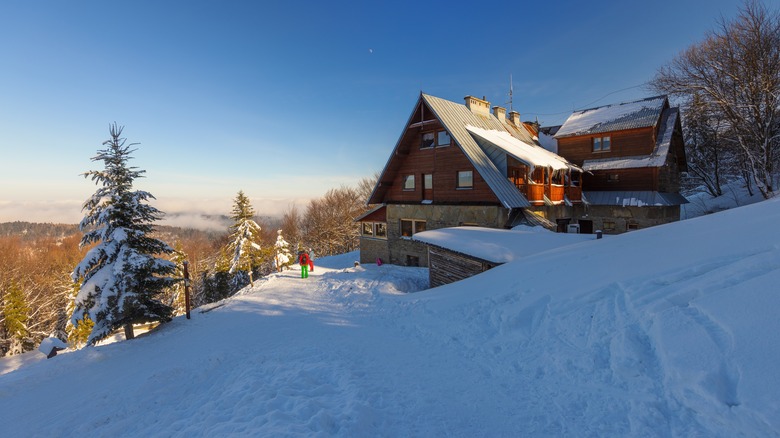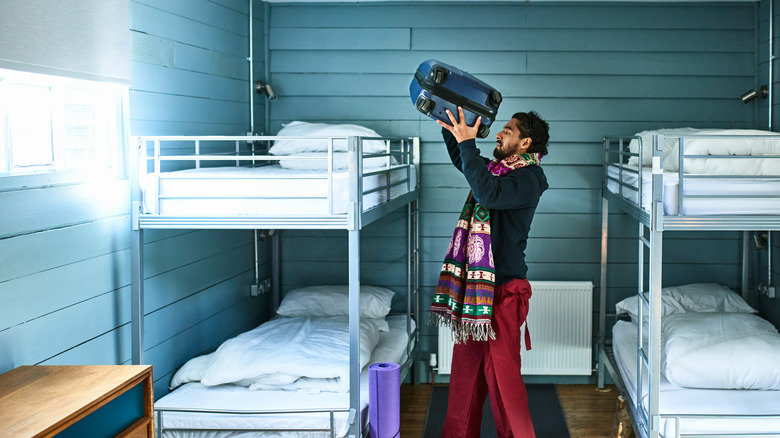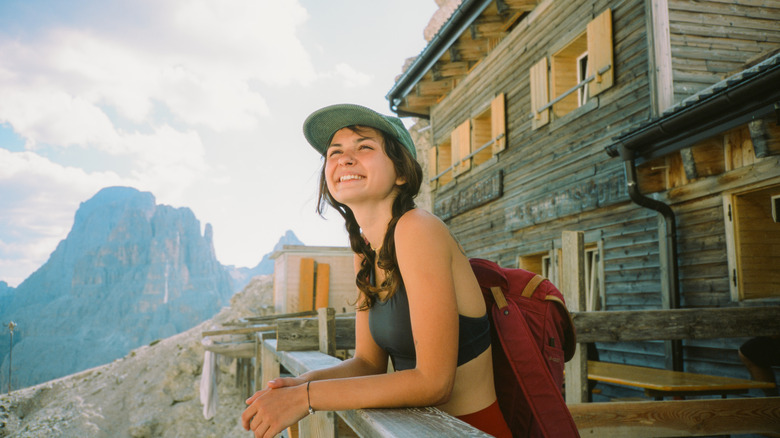The Rustic, Budget Accommodation Rick Steves Enjoys When Traversing Europe's Mountains
While traveling on a tight budget may be getting more difficult, there are still options out there if you are willing to forgo a bit of comfort. When most travelers picture a European mountain getaway, visions of luxurious ski resorts and high-end chalets often come to mind. While that would be an incredible vacation, unfortunately, these options are typically out of many folks' price ranges. But for travel expert Rick Steves, the heart of the journey lies in places far less polished and expensive, offering more of a personal touch. Known for his philosophy of meaningful and authentic travel experiences, Steves usually avoids high-priced lodging and chooses more rustic, budget-friendly accommodations.
Steves has long preached that the best experiences in Europe come when travelers trade high thread counts for high character. Mountain huts, family-run pensions, and no-frills hostels are his go-to choices. These accommodations often feature wooden beams, stone walls, and communal dining tables that encourage camaraderie among hikers, skiers, and adventurers from around the world. For Steves, these stays aren't about amenities — they are about connection.
Instead of five-star lodges, you are more likely to find him bedding down in a hostel tucked into a valley or a simple alpine hut where hikers gather at long wooden tables to share hearty meals. These places may lack infinity pools and designer furnishings, but what they offer instead is priceless: genuine hospitality, local flavor, and the chance to connect with fellow travelers and locals alike. In Steves' eyes, it's not just about saving money — it's about gaining richer stories to bring home. By choosing accommodations that reflect the character of the region, he's able to experience the mountains as locals do, rather than from behind the glass of a luxury resort.
Why hostels are for everyone
While you may think you are too old to stay in a hostel, Steves comments that "If you're alive, you're young enough to hostel just about anywhere in Europe (hostels with age cutoffs are rare). Yes, the bulk of the hosteling crowd is under 30 — but every year there are more seniors and families hosteling." In fact, the hostel scene has changed dramatically in recent decades.
Today's hostels often go beyond the stereotypical bare-bones dormitories of the past. Many now feature private rooms, family suites, and cozy common areas where travelers of all ages can feel comfortable. Steves highlights that the true value of a hostel isn't just the price— it's the community. Whether it's chatting with fellow hikers over breakfast, swapping stories with backpackers on a train-bound itinerary, or joining group activities organized by the hostel, these shared spaces foster the kind of connections that can be hard to find in more isolated accommodations.
For older travelers, especially, hostels can be a surprisingly rewarding option. They are a hub for practical travel advice, a chance to hear about trails, hidden restaurants, or affordable excursions from people who have just experienced them. And because many hostels are centrally located, they offer a convenient and affordable base for exploring nearby mountains, towns, and cultural sites. Steves encourages travelers not to think of hosteling as a sacrifice, but as a choice that opens doors. By staying in these communal spaces, you might spend less money on lodging but gain priceless friendships, memorable experiences, and a deeper sense of camaraderie with fellow adventurers. Not to mention, there are some incredibly unique hostels out there — including the Mountain Hostel Gimmelwald in Switzerland, offering sweeping mountain views and rustic charm.
Consider mountain huts or guesthouses
Outside hostels, one of Steves' favorite types of stays is mountain huts — basic lodgings scattered throughout the Alps and other ranges in Europe. Often run by local alpine clubs, these huts offer bunk-style sleeping quarters, hearty home-cooked meals, and a welcoming atmosphere for hikers and skiers. They are simple — don't expect private bathrooms or luxury bedding — but what they lack in amenities, they make up for with sweeping views, convivial dining rooms, and affordability. For just a fraction of resort pricing, travelers can sleep in the mountains and wake up to sunrise over jagged peaks. Additionally, alpine huts across Switzerland, Austria, and Italy provide budget travelers with a comfortable yet communal experience. Many of these shared rooms are housed in historic buildings or traditional lodges, giving guests a true sense of place while keeping costs low.
Beyond huts and hostels, Steves frequently champions family-run guesthouses as one of the best ways to save money and immerse yourself in local culture. These accommodations — whether tucked into a Swiss valley, an Austrian village, or a remote French hamlet —are usually operated by locals who welcome guests as though they are part of the family. Instead of polished lobbies, you will find homemade breakfasts, personal recommendations for hikes and hidden spots, and sometimes shared dinners with your hosts.
For Steves, these human connections are the essence of travel. Steves emphasizes that rustic doesn't mean unpleasant. Sure, you may have to deal with thin walls, creaky floors, or shared bathrooms, but what you gain is authenticity. Staying in a farmhouse in the Dolomites or a hostel in the French Pyrenees provides insight into traditional mountain life that no luxury hotel can replicate. These accommodations bring travelers closer to fellow adventurers, as well as the natural beauty of the mountains.


